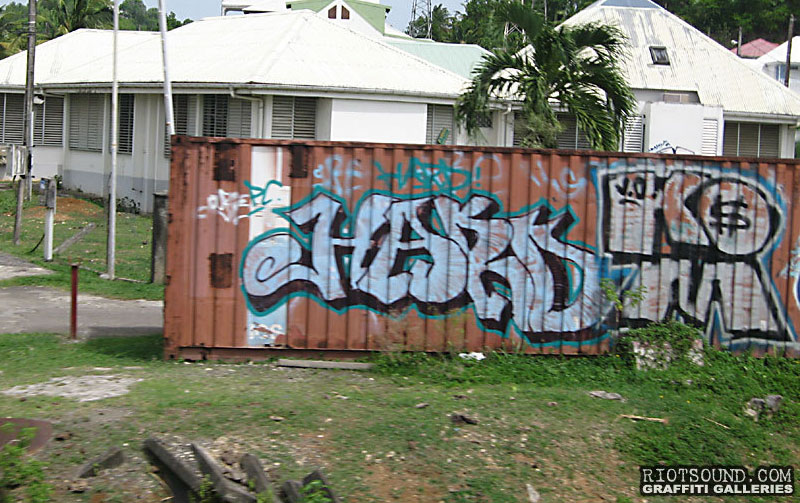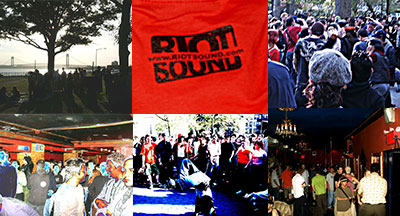by Alex Shtaerman
As one of the architects of postmodern Hip-Hop lyricism, Canibus has built a cult-like following delivering rhyme form sermons marked by an unparalleled level of cryptographic detail and verbal dexterity. Nearly a decade since defeating LL Cool J in one of Hip-Hop’s most legendary battles, Bis continues to persevere as a savage lyricist and worldwide underground icon. After taking a two year hiatus from recording in order to serve his country as part of the U.S. Army Styker Brigade, Canibus returns to Hip-Hop alongside longtime friend Phoenix Orion to recount and chronicle his impressions of war and the military on the apocalyptic nineteen track LP Def Con Zero. Recently we had a chance to catch up with Canibus and see what was on his mind.
RIOTSOUND.COM: You’ve been in the game for over a decade and you’ve developed a cult like following over that time; what do you think it is that draws people to your music?
CANIBUS: I think it’s mainly the integrity of the music that I make. My fanbase, they’re aware of some of the things that I have had to endure throughout the years. Most of the things such as label situations and [the shortcomings] of promotion and marketing schemes and other things that have been done to slow down my productivity. For example, if I had an album that was due out at a certain time, the distributor that I was in pocket with would push it back a month or two or anything of that nature. And the fans have come acclimatized to it. They know that there’s always a force that’s trying to hinder me from just coming out and having a clean shot or clean run. So they like me because they know I am always the underdog. They root for the underdog because most of them are underdogs themselves.
I think that they relate to the lyrics and they relate to a lot of the content. I feel like poetry that was written in the earlier stages of rap music, like about ’84, ’85 anywhere up to ’93 or ’94, the rhymes and the lyrics were something that you could learn something from. You could listen to it and you could learn things about cultures and learn things about places that you’ve never been to before. It wasn’t like it is now. Now it’s just a bunch of people running around telling you about things that they have that you’ll probably never be able to get. It’s different now.
I think after corporate America and a lot of the mainstream facilities realized that rap music was a device that the youth were using to communicate with each other, sometimes in code, sometimes flat out; after they realized it was a mode of communication that we were using to warn each other of things or tell each other about certain things that would kind of be underground topics for discussion, they started to take that away through bigger bonuses and throwing more money into the game. By doing that you made an up and coming artist just want to get on TV as opposed to trying to create a fanbase and a following. It became like – I just wanna be on TV because I want to prove to these people that I can do it!
Once you do that you realize that that’s superficial. I always wanted to be likened to somebody like a Rakim or a Big Daddy Kane or even Chuck D when he was at his peak. Of course my lyrics aren’t as radical as far as civil rights issues because I’m pretty much content with my life and my position as a civilian now in America. But the ideas that I was able to pass on through the music, I wanted to kind of be compared to some of the greats that I listened to growing up. And it seems that the greats now, like who you would call great now, is just somebody who’s been able to make 500 million in corporate America. A lyricist that has invested a decade or two in poetry is not great anymore. If you can get on regular rotation and if your music is available at every listening station and every record store across the country and across the globe, that’s what makes you great. The quality of your poetry is subjective now. No one is being objective about their judgment in the music.
RIOTSOUND.COM: As an MC who is renowned for his lyricism, what would you say are the most important elements in crafting a compelling rhyme in this day and age?
CANIBUS: I don’t want to sound like I am trying to be an ‘80’s throwback or something. I’m updated and my rhymes are updated. I speak about issues that are current. What I mean is that the idea of mainstream and underground has been distorted. The profound lyricism that existed in the ‘80’s still exists today but it’s almost buried before it gets a chance to grow. It’s like nobody is sharing guard duty or sharing playtime.
For example, it’s like the [playoff game] between the Steelers and the Colts. I was watching the game and I was paying close attention to it and it seemed like they were making so many calls that weren’t right [laughs]. And I was looking at it and I was saying to myself – you gotta be shittin’ me. I’m not a super avid football fan but I was watching the game and I just seen so many calls that were really off key. They even complained about it on ESPN and Lou Dobbs was talking about it on CNN. He was like – I can’t believe the NFL made that call. Now my experience leads me to believe that it’s almost like they were trying to give the Colts an advantage over the Steelers. It’s like they were making these calls because maybe somewhere high up the chain someone had invested so much money or put so much on the Colts winning that the refs were making fucked up calls.
Now football is the greatest American sport. If there’s corruption at that level then it’s easy to believe that in music there are certain factions that are distorting certain points of view almost to the point where there is no choice and [the fans] have no choice. There is no way to win. You just have to make your music and try to get your point across and be consistent with it. That’s really all you can do. I can’t compete. At the level that I’m at there’s no way to compete. That’s why the battle rap and all that, in 1998 it wasn’t as prevalent as it is now. I suppose I’m partly responsible for bringing it back that way but now it’s used as more of a marketing ploy than just two artists airing out their differences. Now record labels get involved and they allow you to make the video that totally destroys somebody else’s career. They put money aside for those sorts of things. It’s like the machine catching up to the things that we do.
Things that are underground and things that are done in the underground; after being done for a certain amount of time they’re not underground anymore. People catch on and they say – hey man, you know, that’s not a bad idea; let’s take it and sell it. Let’s sell the turmoil and let’s sell their pain. And some things are just not for sale man. But that’s what a naïve person would say. At this point in my career [I realize] that everything is for sale now, because I’ve seen it [laughs]. I’ve seen it go down to the point where now I know better. I’m not near as naïve as I used to be.
Now what I put a bulk of my work into is just trying to get the music out there. Sometimes people be like – yo, Canibus man, you got this record coming out on this label and then you got a record coming out on that label, you need to just do mixtapes or you need to do this. Everybody always got a suggestion about what I need to do because in their mind they feel like – yo, I know you wanna win, you wanna go platinum, you wanna sell all these records. They don’t understand that where I’m at, I’m just happy to get the music out. It’s a struggle just to get it out. So when it gets out I feel like I won, I feel I won just by getting it on the shelf.
RIOTSOUND.COM: You got two albums that recently dropped on two different labels, the first being Def Con Zero with Phoenix Orion and the second being Hip-Hop For Sale; what can fans expect from each one of the new records?
CANIBUS: It’s understandable why the different sides would feel that way but the Def Con Zero side is like at war with the Hip-Hop For Sale side and vise versa [laughs], you know what I mean. The reason being is because they are fighting for market space and availability in the market place, the shelf space and all that. From my point of view I am happy to have product out there on the shelf. As far as the music, conceptually the two albums are like night and day. One album talks about more what I feel my role in Hip-Hop is and what I’ve learned in the game over the years and what I’m trying to impress upon listeners. It’s just like a victorious statement like – hey man, I’m still in Hip-Hop, I’m still putting music out and I’m still as lyrical as ever. And then the other album is Def Con Zero.
I relate to Def Con Zero a whole lot more because Def Con Zero describes the current situation globally as far as the war and some of the ideals of war as well as some of the positions people take up in war and also the cataclysmic results that we get from war. Def Con Zero is a serious record and that’s the one that I really love. Also there is a DVD that comes with it. It’s a little bit on the lighter side because we didn’t have tanks and billion dollar aircraft to put in the DVD [laughs]. If I had that available I would have really been able to create the visuals for the lyrics.
Def Con Zero describes a defense readiness condition. Some people might just say that it’s an imaginary thing or something that’s more fictitious than real. But I think it’s very real and those who can understand the lyrics and take the time to pay attention and decode the [message] can see that it’s very real. That album right there, I think that album is ahead of its time. Whereas Hip-Hop For Sale is right on time.
RIOTSOUND.COM: Prior to recording Def Con Zero you actually spent two years as part of the U.S. Army Stryker Brigade; what was that experience like?
CANIBUS: It’s always a touchy subject when I talk about my time in the service because some of the things that I was able to experience. My story is no different than that of my battle buddy who doesn’t do music and doesn’t have a soapbox or a platform to tell his story. It’s a touchy subject because here we are, civilians that enlist to defend the freedoms of other people in another part of the globe; we’re defending the freedoms of people here of course but when you deploy you’re defending those freedoms elsewhere. I’d say most of the enlisted personnel do it to make money and to make ends meet. I’m sure if they were getting paid nothing at all they wouldn’t enlist. The bonuses and the things that they get for their families, that’s why they do it.
Some of the youth do it because they don’t want to be home anymore not doing nothing. They want to get up off they ass and do something. They want a little bit of respect from their family members and from some of the people in the areas they grew up in. Even at a young age you could figure out that sometimes the best way to get respect is to just leave, go somewhere else and do something new; kind of make people miss you. In spite of the sacrifices that the men and women in our military make, I just feel like the civilians in America, unless they’re veterans or they have family members that are serving, they’re somewhat cold to it and they are really apathetic to what our soldiers go through. The warrior caste is just like it was in ancient Rome. The warrior caste is not really looked upon as having the same type of equality, like a warrior is supposed to die.
You’d think that centuries later since the Roman empire, you’d think that now we’d be more compassionate because now we have the internet and we have all these devices and media where we could communicate with each other and you can more readily see what people are going through and what they’re dealing with. In ancient Rome it might have taken months for you to get back a casualty report and find out how many troops were lost. Now you find out daily, hourly even. And still there are commercials that glorify the war and there’s movies that glorify it. There’s politicians that get up and they talk real tough about what the troops are supposed to be doing, yet they go home to their families and pretty much live high. They eat off the hog.
My experience was that. My experience is being born in Jamaica, a third world country, getting the opportunity to move to America, falling in love with what at the time was a brand new type of music, taking part in it, sacrificing everything for it but in the end feeling like what I got was less than what I deserved. So I wanted to be recognized as something else. I put rap music down and I enlisted in the service. I went to boot camp and trained with my piers and pretty much forged a relationship with them that will last forever. I put rap down. I did it as Jermaine Williams not as Canibus.
After I got discharged I came back to California and I started to actively record and make more music to speak on some of my experiences. My experience was really just feeling what it was like. What does it feel like to be a robot for Uncle Sam? What does it feel like to really not have an opinion of your own and to take all the intelligence that you’ve gathered over the years and use it but follow specific guidelines that are sent from a higher up? They say to use your judgment but at the same time the rules of engagement hinder you from really using your judgment.
That’s why I say it’s a touchy subject because how can I speak on it without hurting the feelings of some of the guys that I served with or sounding like some type of radical patriot. You can’t be both so I kind of leave it up to the person that I’m talking to, each conversation has to be almost specific. I can talk to someone who has radical Muslim beliefs and have an intelligent discussion with them and I can also talk to someone who’s a patriot with radical patriotic beliefs and I can have an intelligent discussion with them. But you can’t talk to both of them at the same time. That’s pretty much how I leave it.
There’s only so much you can do as an individual. You can’t win a war all by yourself and you can’t lose a war all by yourself either. That subject alone is probably the most stressful thing that I deal with. You look at the casualties and you look at the wounded coming back, you look at Lou Dobbs on CNN, he’s up there talking shit; good shit really, at times. The Democrats and the Republicans, that’s a totally political thing. But when you’re on the battlefield it’s not political. When you’re on the battlefield it’s emotional.
RIOTSOUND.COM: You are often praised for the technical strength and lyrical dexterity of your rhymes; how did you build your style from the time you first started rhyming and who were some of the MCs that you admired that inspired you to pursue this craft?
CANIBUS: Rhetorically speaking, that sort of goes back to what I was saying about the ideology of rap music in the ’80’s. It was a mode of communication that you could learn from. Artists would sit down and write about their beliefs and they’d be technical about it. Artists like Rakim, for example. Big Daddy Kane, he’d use language that you didn’t use in school and you didn’t know it. But by hearing him say it then you’d go to school and you’d try to find out what he was talking about. Artist like The Gza, Killah Priest, Ras Kass, we all came us listening to relatively the same type of music and trying to emulate that in our own way. We wanted to be prophets, if you will, of an unexplored science.
I feel like my lyricism and the dexterity of it has come from trying to recreate and recapture what was being done when I was coming up. I wanna say things that provoke emotion. Because emotion manifests thought and thought manifest words and words manifest action and action manifests reality. Those are the five keys to making something that is in your imagination become real. First I see somebody rapping or I see people doing graffiti or a DJ spinning outside at a little block party. I’m out there and I see somebody get on stage. I see Grandmaster Caz get on stage and rhyme or I see Roxanne Shante or MC Shan or KRS One rocking. Seeing that invokes an emotion in me and that emotion turns into a thought. I’m really moved by what they’re doing so I wanna do it too. And then after the thought comes the words. I start talking about how I’m going to do it. Then the action is me writing the rhymes and me going to all these talent shows and all the battles that I’ve experienced and been through. And then it becomes a reality.
Now I walk down the street and if it’s in a town where people love Hip-Hop music and somebody sees me, it doesn’t matter what I’m doing or where I’m at, I could be overseas, somebody is going to say – yo man, you look like Canibus. I didn’t make it that way by skipping any of those steps; I made it that way by following each and every one of those steps. I’m just emulating what I came up seeing. And I’m doing it in my way, I’m putting my tint on it and I’m grateful for being able to have done it and I’m grateful for the fans. They give me the energy back that I have been putting out there for so many years. And that’s why I say I’m only doing what I was impressed upon to do.
My thing right now, if you want to know what I wish I could do or what I hope to do or what I’m charged to do or what I’m compelled to do right now, it’s to inspire people who are writing rhymes. If they got profound statements and lyrics and they’re just putting all their time and energy into wring the poetry, I would just like to inspire them to feel as though it’s not in vain when you make the music and it doesn’t sell off the charts. It’s still not in vain. People are still listening and you’re still making a difference. But in order to inspire them I have to have some level of success too. That’s my biggest penchant, just being successful. I’m successful at being a lyricist, successful at being known for stellar lyricism but there is no other success. And I think that is uninspiring to a fan that has got lyrics out of this world but they want to go get a record deal and they want to go buy their mom a house and they want to go floss and run around town.
No one ranks the success of the lyricism, they only rank material success and that’s the hardest internal war that I have had to fight. Saying to myself, does it matter? Well of course it matters! If I go to the show and here I am performing for 3000 people and I show up walking to the venue and I leave walking, does it make me any less of a lyricist? No. But how does it look to the fan that’s saying – man, Canibus is incredible. Then he sees me and it’s like – Canibus ain’t what I thought he was gonna be. That shit fucks with me more than anything else.
That’s why a lot of times I am reclusive and I am a recluse. Just like Rakim, just like Big Daddy Kane. I’m not putting their business out there like that because for all I know everything could be peachy with them. I’m just saying that if people sit there and they’re wondering like – yo man, why don’t you do shows, why don’t you come out, the people just wanna see you. Yea, I know people want to see me. But once they see me, how does that inspire them? Does it make them go home and switch up their shit? And say – yo, I don’t want to be lyrical no more, fuck that, I need to just make me some club songs ‘cause I need to get on the radio; I don’t wanna be like Canibus; I don’t want to speak my mind and try to make the art grow and get blackballed, I don’t wanna be like him.
I’m so glad you asked me this question and I ended up saying this, because it’s embarrassing to talk about it sometimes. It’s like, how can you have eight or nine albums out and be a decade into the game and still be scrambling to get studio time and scrambling to get backing from artists who get backing in an industry where I helped create a lot of the shit that’s out there now. If Hip-Hop is a religion then I am one of the disciples. I’m one of the twelve too, I’m not like the fucking thirtieth disciple; I’m in the twelve.
For more Canibus news and info stay tuned to www.CanibusWorld.com

































Comments